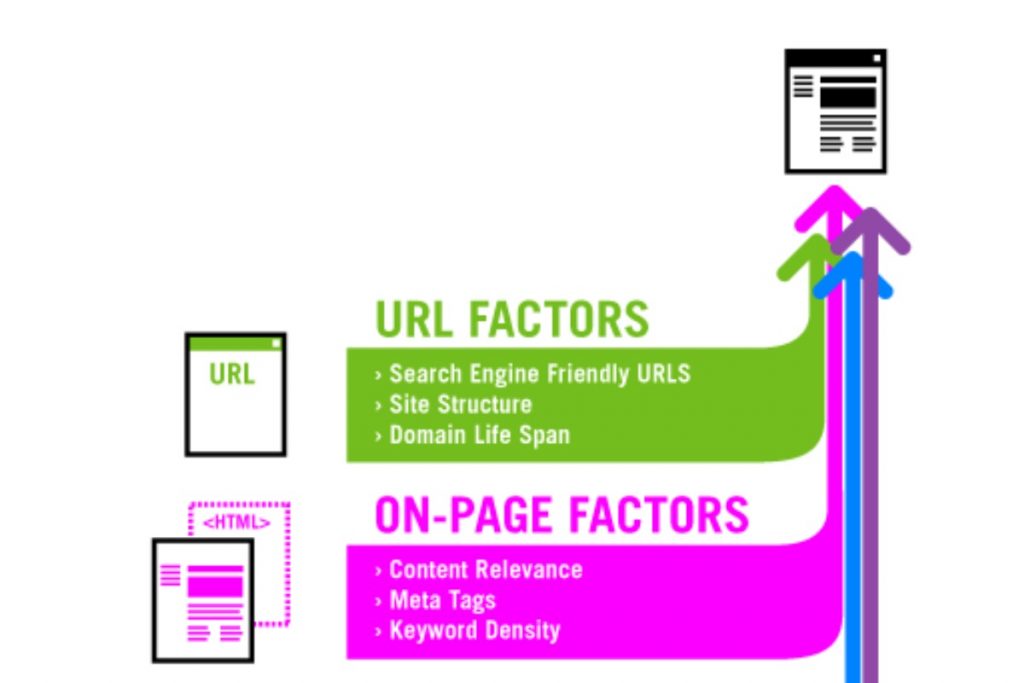| Jan 3, 2013
URL Optimization: Issues & Benefits of Doing it Right

Google, when determining the ranking of a page, takes hundreds of factors into account. The precise algorithm is a closely guarded secret, but over time and through our work with a variety of clients, we have determined four major optimization factors that one should focus on when optimizing a page. We created an SEO factors infographic to explain this concept.
One of those optimization factors is the URL of a page. When we optimize client sites — whether in higher education, manufacturing, or any other industry – we often run into situations where page optimization calls for URL optimization. To have a well-optimized page, the URL of the page should be search friendly, should clearly represent the information on the page, and should be consistent with the overall website structure. But in many cases, this is easier said than done.
Here are some issues which can make URL optimization a challenge:
The URL is tied to page title, header or navigation
Some content management systems tie the URL of a page with the title, header or navigation. So changing the URL will affect not just one but many elements on a page or vice versa. In many cases, you want the header to be different as it is one of the most prominent features of a page. For example, the “About” page on a university website might have a History section at the top of the page with the header ‘History’. If the URL is tied in with the page header, the URL will show up as ‘.edu/history’ and not ‘.edu/about-us’ which is a misrepresentation of the content of the page.
The URL is a directory name
In some cases, changing a URL might affect the whole sub-directory of URLs. For example, ‘.edu/about-school’ could be a directory which has many sub-pages like ‘.edu/about-school/history’. Changing ‘.edu/about-school’ will affect all the other sub-URLs and could cause many issues like broken links across the site making the site inaccessible to users and search engines alike.
The URL is dynamically generated
For e-commerce sites this is a very common issue. If a site has pages that represent thousands of products, the URLs for those product pages will be tied to the product category, subcategory, product ID, etc. And that can result in a very long and confusing URL, which is neither search engine nor user friendly.
If you’re a marketing or communications person managing a website or taking responsibility for search engine optimization, you may need to work with your IT team or CMS vendor to resolve these issues.
Your choice of a content management system can make URL optimization either easy or extremely difficult to implement. Some of the major changes for URL optimization will include creating clean URLs without session parameters, implementing 301 redirects, and if possible, a customizable URL structure. Making sure the content management system you choose provides you flexibility to control these factors will save a lot of time, money and effort when you optimize your website.
Once you’ve worked through the issues above to arrive at the search friendly URL for your page, you’ll have a little bit more work to do! You can’t just leave the old URL hanging, which would indicate two URLs pointing to the same content. Search engines will consider this duplicate content and can penalize your site as a result. The best way to deal with this situation is to point the old URL to the new through a server side permanent 301 redirect.
Here are some benefits of using a 301 redirect:
- One unique URL for one page of content: This helps prevent duplicate content penalties by search engines.
- Transferable “link juice”: Most of the value from the links will transfer over to the new URL through a 301 redirect.
- Fewer internal and external linking issues: Links pointing to your page from across the site as well as links from other external sites will automatically be redirected to the new page.
- Unique pages on site are crawled: Search engine bots use a limited bandwidth for each site. If you have 301 redirects in place, there is a higher likelihood that the pages they visit and index are unique rather than duplicate ones.
Success in search engine optimization can require effort, but yields incredible results. It’s worth your time and energy in the long run.
Learn more about our search marketing services.
